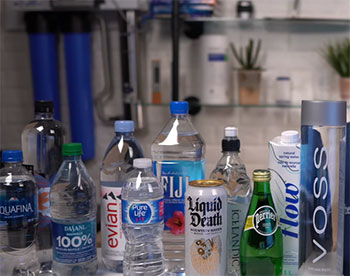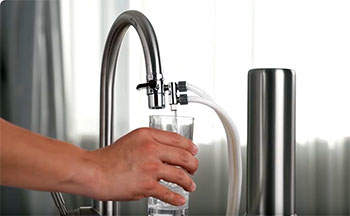Ah, the age-old debate: bottled water versus tap water. It’s a topic that has been hotly contested for years, with both sides vehemently defending their preferred source of hydration. But fear not, dear reader, for we’re about to embark on a journey to unravel the mysteries of this epic water battle.
In this comprehensive article, we’ll delve into the details that separate these two contenders, exploring the potential advantages and drawbacks of each. From taste and purity to environmental impact and cost, we’ll leave no stone unturned in our quest to determine whether bottled water truly reigns supreme or if good ol’ tap water deserves a spot on the hydration throne.
So, grab your favorite reusable water bottle (because let’s be eco-conscious here), and let’s concentrate on it!
The Allure of Bottled Water: Purity and Convenience
There’s no denying the allure of bottled water. With its sleek packaging and promises of pristine purity, it’s easy to see why so many consumers have embraced this portable hydration option. But what exactly makes bottled water so appealing?
1. The Pursuit of Purity

One of the most significant selling points of bottled water is its purported purity. Many bottled water brands boast rigorous filtration processes that remove impurities, contaminants, and undesirable tastes or odors. This perceived purity can be particularly appealing to those concerned about the quality of their tap water or those seeking a cleaner, more refreshing taste.
2. Convenience on the Go
In our fast-paced, on-the-go lifestyles, bottled water offers unparalleled convenience. Whether you’re commuting, exercising, or simply out and about, having a refreshing bottle of water at your fingertips can be a game-changer. No need to worry about finding a water fountain or carrying a bulky reusable bottle – just grab and go!
3. A Taste for the Exotic
Let’s be honest, there’s a certain allure to sipping on water that has been sourced from exotic locations or natural springs. Many bottled water brands play into this desire by highlighting the unique origins and mineral compositions of their products, enticing consumers with the promise of a truly unique hydration experience.
The Case for Tap Water: Cost-Effective and Eco-Friendly
While bottled water may have its appeal, there’s a strong case to be made for good old-fashioned tap water. Not only is it more cost-effective in the long run, but it also boasts a significantly smaller environmental footprint – a win-win for your wallet and the planet.
1. The Cost-Saving Champion

Let’s face it, bottled water can be a significant drain on your finances, especially if you’re a regular consumer. In contrast, tap water is readily available and incredibly affordable, with most municipalities charging a mere fraction of the cost for a virtually unlimited supply.
2. Eco-Friendly and Sustainable
The production, transportation, and disposal of plastic bottles have a substantial impact on the environment. By choosing tap water, you’re effectively reducing your carbon footprint and minimizing the amount of plastic waste that ends up in landfills or polluting our oceans.
3. Quality Control and Regulations
Contrary to popular belief, tap water in many areas is subject to stringent quality control measures and regulations. Municipal water suppliers are required to adhere to strict standards for safety, purity, and quality, ensuring that the water you’re drinking is clean and fit for consumption.
The Potential Drawbacks: Addressing Concerns
While both bottled water and tap water have their merits, it’s important to acknowledge the potential drawbacks and concerns associated with each option. Let’s take a closer look at some of the key issues that may influence your decision.
Bottled Water Drawbacks:
- Environmental Impact: The production, transportation, and disposal of plastic bottles contribute significantly to greenhouse gas emissions, plastic pollution, and the depletion of natural resources.
- Cost: Over time, the cost of buying bottled water can add up, making it a less economical choice for regular hydration needs.
- Potential Contaminants: Despite claims of purity, some bottled water brands have been found to contain trace amounts of contaminants or plastic particles due to improper handling or storage.
Tap Water Drawbacks:
- Taste and Odor: Depending on your local water source and treatment processes, tap water may have an undesirable taste or odor that some find unpalatable.
- Aging Infrastructure: In areas with older water distribution systems, there is a risk of contamination from lead or other materials leaching into the water supply.
- Potential Contaminants: While regulated, tap water may still contain trace amounts of contaminants like chlorine, fluoride, or even pharmaceutical residues, depending on the source and treatment methods.
Striking a Balance: Responsible Hydration Habits
As with most debates, the decision between bottled water and tap water may not be a clear-cut one. Instead, it’s about striking a balance and adopting responsible hydration habits that work best for your lifestyle, preferences, and environmental consciousness.
For those who prefer the taste and perceived purity of bottled water, consider investing in a high-quality reusable water bottle and refilling it from trusted sources. This approach allows you to enjoy the convenience of portable water while minimizing your environmental impact and long-term costs.
If tap water is your preferred choice, explore options like filtered water pitchers or faucet-mounted filters to address any taste or odor concerns. Additionally, stay informed about your local water quality reports and take necessary precautions if there are known issues with your municipal water supply.
Ultimately, the key is to prioritize hydration while being mindful of your environmental footprint and making informed choices based on your specific needs and circumstances.
Also watch the video about bottled water!
FAQ: Addressing Your Burning Water Questions
To help you navigate the world of bottled water and tap water with confidence, we’ve compiled a list of frequently asked questions and their corresponding answers:
Bottled water is not necessarily healthier than tap water. While it may be perceived as purer due to filtration processes, tap water in many areas is subject to stringent quality control measures and regulations to ensure safety and purity.
The main benefits of bottled water include perceived purity, convenience, and a variety of unique tastes and mineral compositions. However, these benefits come with potential drawbacks, such as environmental impact and higher long-term costs.
Some potential disadvantages of tap water include undesirable tastes or odors, aging infrastructure that may lead to contamination, and the presence of trace amounts of contaminants like chlorine or fluoride. However, many of these issues can be addressed through proper treatment and filtration.
The primary disadvantage of bottled water is its environmental impact. The production, transportation, and disposal of plastic bottles contribute significantly to greenhouse gas emissions, plastic pollution, and the depletion of natural resources. Additionally, bottled water can be more expensive in the long run compared to tap water.
Also Read: Halo 5 Water System Vs. Pelican Water Filter System
Conclusion
And there you have it, friends – a comprehensive exploration of the age-old battle between bottled water and tap water. While both options have their pros and cons, it’s clear that the choice ultimately comes down to personal preferences, environmental consciousness, and individual circumstances.
If you’re someone who prioritizes convenience, perceived purity, and a wide range of taste options, bottled water may be the way to go – just be mindful of your environmental impact and consider investing in a reusable bottle to minimize waste.
On the other hand, if cost-effectiveness, sustainability, and a desire to reduce your carbon footprint are at the top of your priorities, tap water is a perfectly viable and often safer option, especially in areas with stringent quality control measures.
Regardless of your choice, remember that the key to optimal hydration is to simply drink water – whether it’s from a bottle, a tap, or a fancy schmancy filter. So, raise your glass (or bottle) and toast to a well-hydrated, environmentally-conscious life!
